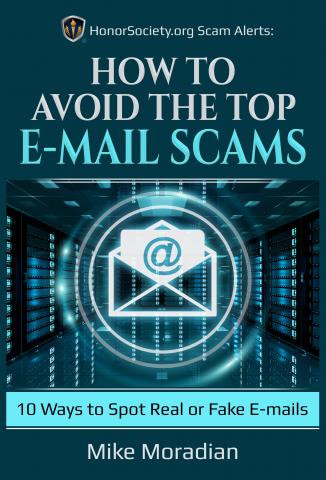How to Avoid the Top E-mail Scams - Book Preview
Aug 17,2020
This is from the Honor Society published book called "How to Avoid the Top E-mail Scams" by Mike Moradian, written to help protect our member and student community from common online scams. To learn more about the book or to purchase a copy, click here.
A Message from Our Founder: Mike Moradian
More Internet hackers, scammers, and phishing experts than ever before are flocking to email today in an effort to obtain personal information, bank account information, or identification information that can ruin a person’s life. With the continual release of new technology, AI, and other automated tools that can make it easy for someone to send fake emails, over and over again, singular attackers are able to impact thousands of students, applications, job-seekers, and graduates today.
Just look at this statistic, for example: phishing attacks grew by 162% between 2010 and 2014. On average, these attacks cost organizations around the world $4.5 billion every single year, with over 50% of internet users receiving at least one phishing email per day. Despite software and other safety walls that are designed to keep phishing emails from landing in your inbox, at the rate at which these hackers are refining their technology, some still manage to slip through.
Naturally, individuals looking for scholarships, information from college admission’s boards, responses from organizations or places of employment, and other acceptance letters are going to be at risk for opening a phishing email that promises an answer to one of these questions. It’s inevitable.
Our Duty Here at HonorSociety.org
As the founder of HonorSociety.org, an academic honor society that works to advance the positioning and education of our members, helping with everything from professional information and job placements, to scholarships, I feel it is my duty to equip all students and job-seekers out there with the awareness they need to be protected in today’s phishing world.
Personally working as internet entrepreneur, founding CampusBuddy and CollegeBudget in addition to HonorSociety.org, I know what lurks in the e-commerce waters for any kind of company today. I have to work daily on the defense against these attackers, just as much as I work on the offense to develop new outreach strategies. HonorSociety.org is no different – except with this platform, it’s one that can put hard-working students, job-seekers, and graduates at risk.
That brings us to this e-book, where I am going to look at 10 ways for you to easily spot a real or fake email. If you are reading this, you have probably already received a phishing email in your inbox, at some point, that you knew was fake. Many emails are obviously fake. But, with each passing day, these attackers are becoming more sophisticated, which means that “fake” line is becoming harder and harder to identify.
HonorSociety.org Email Scam Alerts is going to cover clever ways in which you can truthfully decide if you are dealing with a real or fake email by the time you complete our checklist, as well as a few tips for knowing if an email is, indeed, real.
Remember: your personal information, ID, and bank account information can be at risk if you are not careful with these phishing emails, which is why it’s wise to go through your inbox each day clear headed and with time set aside to properly look over each email.
Let’s get started. You have no time to lose!
For more on how to protect yourself online, read tips from our published book below:
Intro: How to Avoid the Top E-mail Scams
Tip #1: Look for the Display Name
Tip #2: Do Not Click the Links
Tip #3: Scan for Spelling Errors
Tip #4: Look for Personal Information Requests
Tip #5: The Offer is Unrealistic
Tip #6: You Never Initiated the E-mail
Tip #7: The Email Requests You Send Money
Tip #8: The Message Contains Some Kind of Threat
Tip #9: The Email Claims to be From a Bank or Government Agency
Tip #10: Your Gut Tells You Something is Wrong
Extra Credit #1: Tips for Staying on Top of Phishers
Extra Credit #2: Knowing When It's a Real Email: 5 Tips





